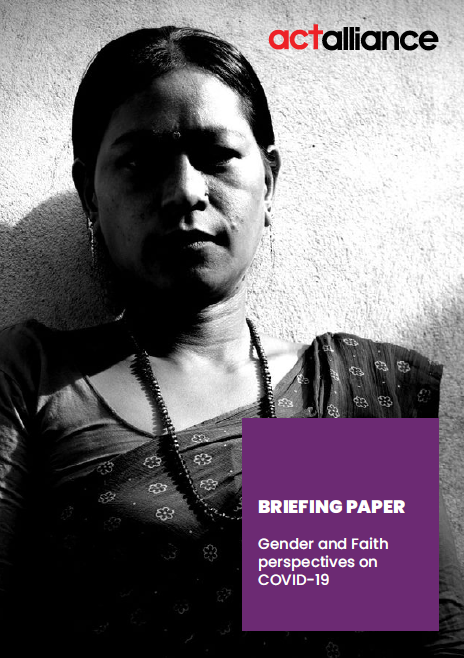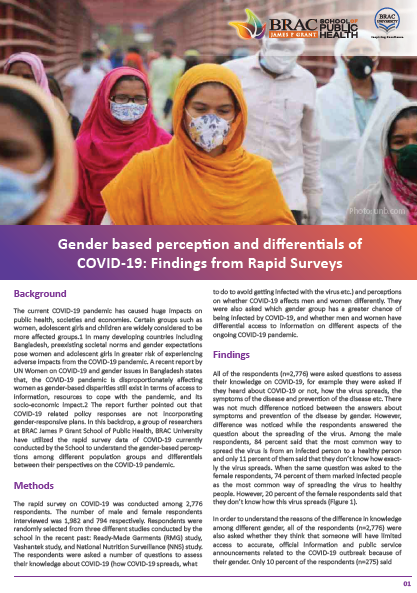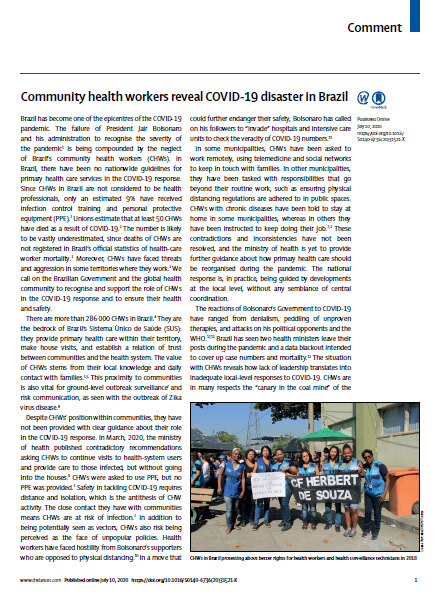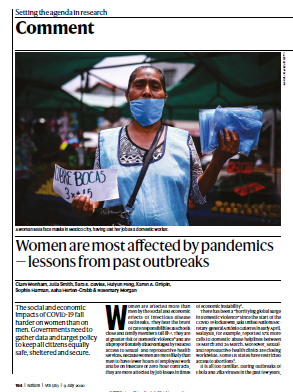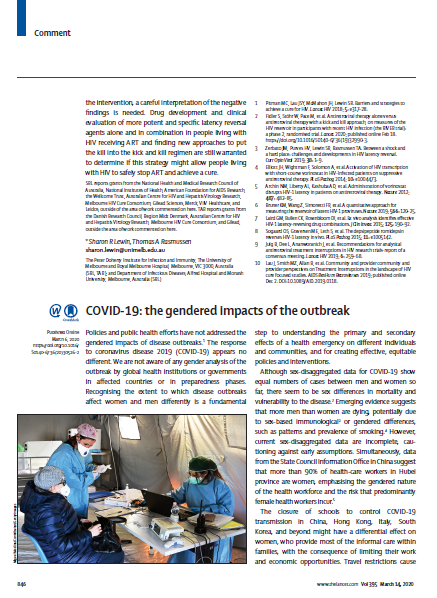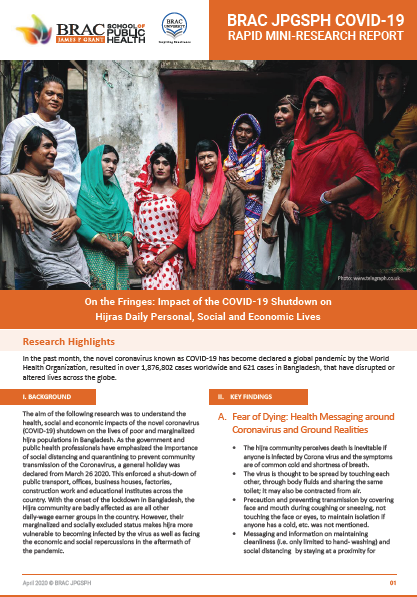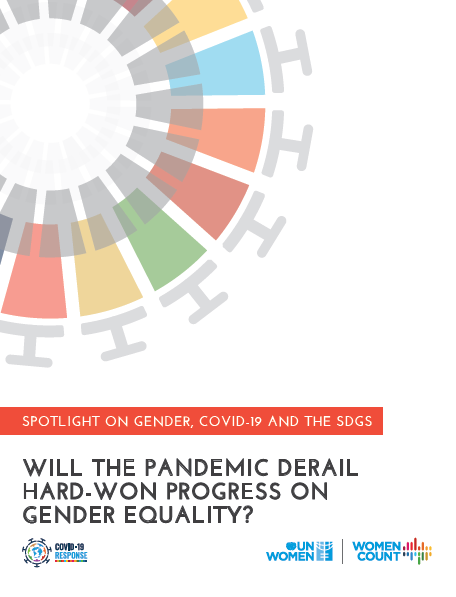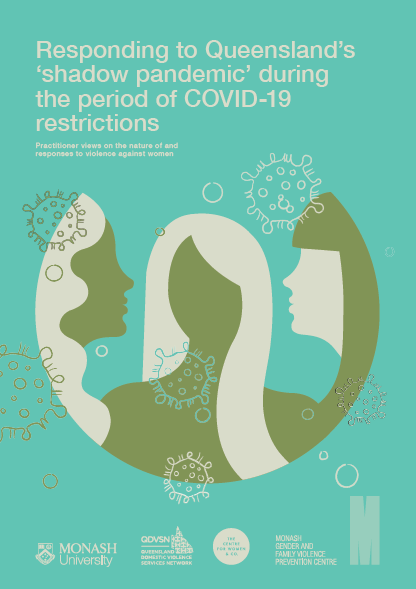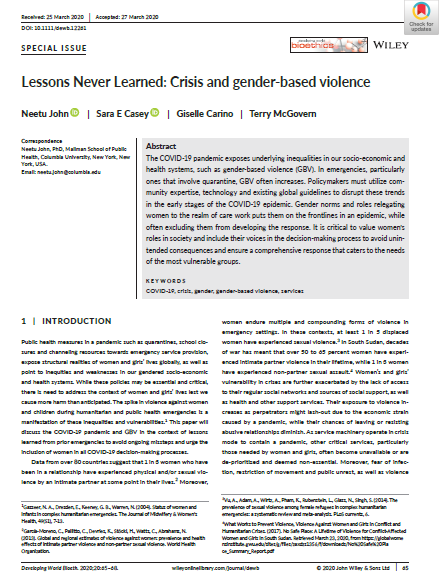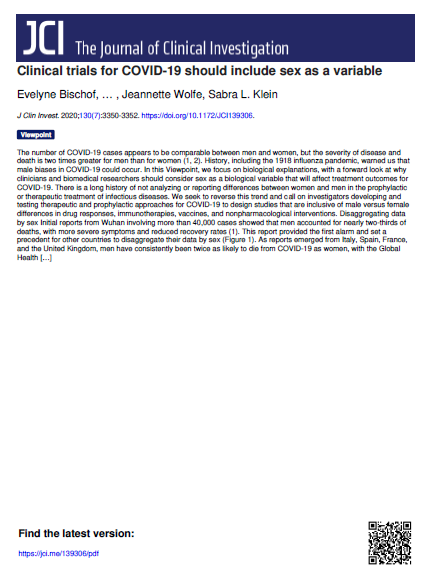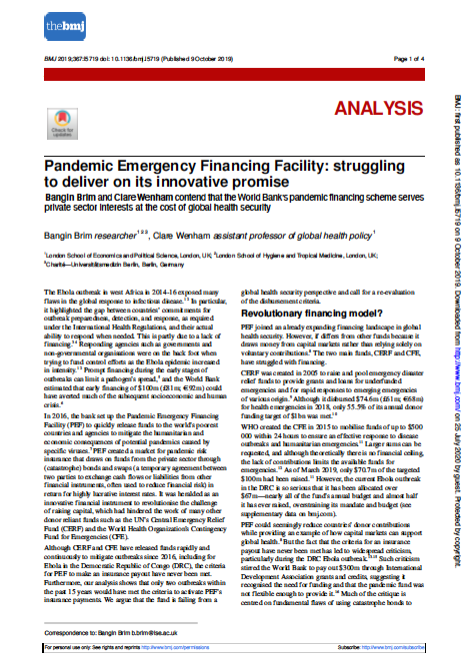Resources
![]()
This is a collection of resources from the Gender and Public Health Emergencies project and the Gender Working Group. You can search by year, country and type of resource. We hope you will enjoy reading this growing body of knowledge from around the world.
We have a wider collection of Gender and COVID-19 resources in this google document which is curated by Rosemary Morgan.
This briefing paper provides key messages on the main issues for ACT Alliance as we address the gendered dimensions of COVID-19 and our response. It spells out recommendations for ACT Alliance members and other stakeholders beyond the Alliance, such as policy makers and private sector actors. Our work on gender justice, from a faith perspective, […]
The current COVID-19 pandemic has caused huge impacts on public health, societies and economies. Certain groups such as women, adolescent girls and children are widely considered to be more affected groups. In many developing countries including Bangladesh, pre-existing societal norms and gender expectations pose women and adolescent girls in greater risk of experiencing adverse impacts […]
Brazil has become one of the epicentres of the COVID-19 pandemic. The failure of President Jair Bolsonaro and his administration to recognise the severity of the pandemic is being compounded by the neglect of Brazil’s community health workers (CHWs). In Brazil, there have been no nationwide guidelines for primary health care services in the COVID-19 […]
Here, we call for COVID-19 research, response and recovery efforts that are tailored to support women. The three priorities are to tackle domestic violence; ensure access to sexual and reproductive health services; and support women’s livelihoods. We recognize that gender is neither binary nor fixed; that the pandemic differentially affects non-binary and transgender people; and […]
Policies and public health efforts have not addressed the gendered impacts of disease outbreaks. The response to coronavirus disease 2019 (COVID-19) appears no different. We are not aware of any gender analysis of the outbreak by global health institutions or governments in affected countries or in preparedness phases. Recognising the extent to which disease outbreaks affect […]
The aim of the research was to understand the health, social and economic impacts of the novel coronavirus (COVID-19) shutdown on the lives of poor and marginalized hijra populations in Bangladesh. As the government and public health professionals have emphasized the importance of social distancing and quarantining to prevent community transmission of the Coronavirus, a […]
COVID-19 has been declared a public health emergency of international concern and a global pandemic by the World Health Organization. This global threat to health security underscores the urgent need to accelerate progress on achieving Sustainable Development Goal (SDG) 3 and the need to massively scale up international cooperation to deliver on SDG 3. It also reveals what […]
This Report presents the findings from two surveys conducted by the Queensland Domestic Violence Services Network over a ten-day period in April (15 April to 24 April) and a two-week period in May 2020 (8 May to 22 May). The surveys sought to capture the professional views and experiences of practitioners responding to women experiencing […]
The COVID‐19 pandemic exposes underlying inequalities in our socio‐economic and health systems, such as gender‐based violence (GBV). In emergencies, particularly ones that involve quarantine, GBV often increases. Policymakers must utilize community expertise, technology and existing global guidelines to disrupt these trends in the early stages of the COVID‐19 epidemic. Gender norms and roles relegating women […]
Could COVID-19 help unravel gender norms? Anneliese Dodds was giving her first interview as the UK’s shadow chancellor on 6 April when her young daughter gate crashed the video call. The TV presenter resolutely responded, “She’s welcome any time on this programme.” This contrasts with the widely shared clip of political analyst Robert E Kelly, […]
Emerging evidence from China suggests that coronavirus disease 2019 (COVID-19) is deadlier for infected men than women with a 2.8% fatality rate being reported in Chinese men versus 1.7% in women. Further, sex-disaggregated data for COVID-19 in several European countries show a similar number of cases between the sexes, but more severe outcomes in aged […]
This article contributes to discussions on the gender dimensions of disease outbreaks, and preparedness policies and responses, by providing a multi-level analysis of gender-related gaps, particularly illustrating how the failure to challenge gender assumptions and incorporate gender as a priority at the global level has national and local impacts. The implications of neglecting gender dynamics, […]
COVID-19 school closures pose significant operational and financial risks to frontline organizations delivering vital education services, including non-governmental organizations, school operators, and other service providers. In this survey, we ask these organizations about the challenges they are facing in light of COVID-19 closures, particularly for girls. The responses shed light on how COVID-19 is affecting […]
Around the world, cash transfer programs are being rolled out by governments to mitigate economic hardship brought on by the ongoing pandemic. In Pakistan, the Ehsaas Emergency Cash Program was introduced in April and rolled out to four groups of beneficiaries, largely relying on mobile phone registrations and requiring a national ID to register. Due […]
A practical guide for program implementation and adaptation. Jhpiego developed operational guidance that synthesizes global recommendations, current best evidence and critical resources to help health care providers, managers and leaders to maintain essential health services, including for family planning, gender-based violence, and maternal health, during and after the pandemic, and ensure families receive the care […]
In this brief, we summarize findings from 17 studies so far linking COVID-19 and violence against women and girls, and discuss data limitations and outstanding questions. Peterman A, O’Donnell M, Palermo T. Center for Global Development Note: Covid-19 and Violence against Women and Children What Have We Learned So Far?; 2020
As social protection programs and systems adapt to mitigate against the COVID-19 crisis, gender considerations are likely to be overlooked in an urgent effort to save lives and provide critical economic support. Yet past research and learning indicates that small adaptations to make program design and implementation more gender-sensitive may result in overall and equality-related […]
Times of economic uncertainty, civil unrest, and disaster are linked to a myriad of risk factors for increased violence against women and children (VAW/C). Pandemics are no exception. In fact, the regional or global nature and associated fear and uncertainty associated with pandemics provide an enabling environment that may exacerbate or spark diverse forms of […]
The number of COVID-19 cases appears to be comparable between men and women, but the severity of disease and death is two times greater for men than for women. History, including the 1918 influenza pandemic, warned us that male biases in COVID-19 could occur. In this Viewpoint, we focus on biological explanations, with a forward […]
The Ebola outbreak in west Africa in 2014-16 exposed many flaws in the global response to infectious disease. In particular, it highlighted the gap between countries’ commitments for outbreak preparedness, detection, and response, as required under the International Health Regulations, and their actual ability to respond when needed. This is partly due to a lack […]
Resources
![]()
This is a collection of resources from the Gender and COVID-19 project and the Gender Working Group. You can search by year, country and type of resource. We hope you will enjoy reading this growing body of knowledge from around the world.
We have a wider collection of Gender and COVID-19 resources in this google document which is curated by Rosemary Morgan.
This briefing paper provides key messages on the main issues for ACT Alliance as we address the gendered dimensions of COVID-19 and our response. It spells out recommendations for ACT Alliance members and other stakeholders beyond the Alliance, such as policy makers and private sector actors. Our work on gender justice, from a faith perspective, […]
The current COVID-19 pandemic has caused huge impacts on public health, societies and economies. Certain groups such as women, adolescent girls and children are widely considered to be more affected groups. In many developing countries including Bangladesh, pre-existing societal norms and gender expectations pose women and adolescent girls in greater risk of experiencing adverse impacts […]
Brazil has become one of the epicentres of the COVID-19 pandemic. The failure of President Jair Bolsonaro and his administration to recognise the severity of the pandemic is being compounded by the neglect of Brazil’s community health workers (CHWs). In Brazil, there have been no nationwide guidelines for primary health care services in the COVID-19 […]
Here, we call for COVID-19 research, response and recovery efforts that are tailored to support women. The three priorities are to tackle domestic violence; ensure access to sexual and reproductive health services; and support women’s livelihoods. We recognize that gender is neither binary nor fixed; that the pandemic differentially affects non-binary and transgender people; and […]
Policies and public health efforts have not addressed the gendered impacts of disease outbreaks. The response to coronavirus disease 2019 (COVID-19) appears no different. We are not aware of any gender analysis of the outbreak by global health institutions or governments in affected countries or in preparedness phases. Recognising the extent to which disease outbreaks affect […]
The aim of the research was to understand the health, social and economic impacts of the novel coronavirus (COVID-19) shutdown on the lives of poor and marginalized hijra populations in Bangladesh. As the government and public health professionals have emphasized the importance of social distancing and quarantining to prevent community transmission of the Coronavirus, a […]
COVID-19 has been declared a public health emergency of international concern and a global pandemic by the World Health Organization. This global threat to health security underscores the urgent need to accelerate progress on achieving Sustainable Development Goal (SDG) 3 and the need to massively scale up international cooperation to deliver on SDG 3. It also reveals what […]
This Report presents the findings from two surveys conducted by the Queensland Domestic Violence Services Network over a ten-day period in April (15 April to 24 April) and a two-week period in May 2020 (8 May to 22 May). The surveys sought to capture the professional views and experiences of practitioners responding to women experiencing […]
The COVID‐19 pandemic exposes underlying inequalities in our socio‐economic and health systems, such as gender‐based violence (GBV). In emergencies, particularly ones that involve quarantine, GBV often increases. Policymakers must utilize community expertise, technology and existing global guidelines to disrupt these trends in the early stages of the COVID‐19 epidemic. Gender norms and roles relegating women […]
Could COVID-19 help unravel gender norms? Anneliese Dodds was giving her first interview as the UK’s shadow chancellor on 6 April when her young daughter gate crashed the video call. The TV presenter resolutely responded, “She’s welcome any time on this programme.” This contrasts with the widely shared clip of political analyst Robert E Kelly, […]
Emerging evidence from China suggests that coronavirus disease 2019 (COVID-19) is deadlier for infected men than women with a 2.8% fatality rate being reported in Chinese men versus 1.7% in women. Further, sex-disaggregated data for COVID-19 in several European countries show a similar number of cases between the sexes, but more severe outcomes in aged […]
This article contributes to discussions on the gender dimensions of disease outbreaks, and preparedness policies and responses, by providing a multi-level analysis of gender-related gaps, particularly illustrating how the failure to challenge gender assumptions and incorporate gender as a priority at the global level has national and local impacts. The implications of neglecting gender dynamics, […]
COVID-19 school closures pose significant operational and financial risks to frontline organizations delivering vital education services, including non-governmental organizations, school operators, and other service providers. In this survey, we ask these organizations about the challenges they are facing in light of COVID-19 closures, particularly for girls. The responses shed light on how COVID-19 is affecting […]
Around the world, cash transfer programs are being rolled out by governments to mitigate economic hardship brought on by the ongoing pandemic. In Pakistan, the Ehsaas Emergency Cash Program was introduced in April and rolled out to four groups of beneficiaries, largely relying on mobile phone registrations and requiring a national ID to register. Due […]
A practical guide for program implementation and adaptation. Jhpiego developed operational guidance that synthesizes global recommendations, current best evidence and critical resources to help health care providers, managers and leaders to maintain essential health services, including for family planning, gender-based violence, and maternal health, during and after the pandemic, and ensure families receive the care […]
In this brief, we summarize findings from 17 studies so far linking COVID-19 and violence against women and girls, and discuss data limitations and outstanding questions. Peterman A, O’Donnell M, Palermo T. Center for Global Development Note: Covid-19 and Violence against Women and Children What Have We Learned So Far?; 2020
As social protection programs and systems adapt to mitigate against the COVID-19 crisis, gender considerations are likely to be overlooked in an urgent effort to save lives and provide critical economic support. Yet past research and learning indicates that small adaptations to make program design and implementation more gender-sensitive may result in overall and equality-related […]
Times of economic uncertainty, civil unrest, and disaster are linked to a myriad of risk factors for increased violence against women and children (VAW/C). Pandemics are no exception. In fact, the regional or global nature and associated fear and uncertainty associated with pandemics provide an enabling environment that may exacerbate or spark diverse forms of […]
The number of COVID-19 cases appears to be comparable between men and women, but the severity of disease and death is two times greater for men than for women. History, including the 1918 influenza pandemic, warned us that male biases in COVID-19 could occur. In this Viewpoint, we focus on biological explanations, with a forward […]
The Ebola outbreak in west Africa in 2014-16 exposed many flaws in the global response to infectious disease. In particular, it highlighted the gap between countries’ commitments for outbreak preparedness, detection, and response, as required under the International Health Regulations, and their actual ability to respond when needed. This is partly due to a lack […]
